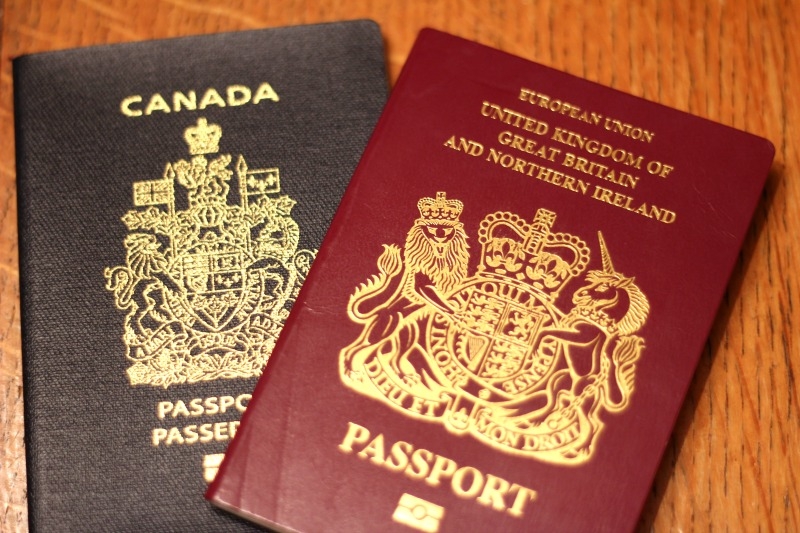If you’re considering starting a new life abroad, two of the most popular destinations for immigrants are the United Kingdom and Canada. But which one is better suited for you? The answer depends on many factors, including the immigration process, job opportunities, cost of living, and more. In this post, we’ll dive into the key differences between the UK and Canada to help you make an informed decision about where to go.
Immigration Process
The immigration process is the first hurdle any prospective immigrant must navigate. Both the UK and Canada have different approaches, and understanding their systems is crucial to making the right decision.

Canada:
Canada offers multiple pathways for immigrants, making it a flexible choice. It uses a points-based system through Express Entry, which makes the process more accessible, especially for skilled workers without a job offer. The points are based on factors like age, education, and work experience, allowing applicants to improve their chances by upgrading their qualifications or improving language skills.
- Express Entry System: This is the primary way to apply for permanent residency. You’re ranked based on your Comprehensive Ranking System (CRS) score, and if you meet the cutoff, you’re invited to apply.
- Provincial Nominee Program (PNP): Provinces can nominate candidates with specific skills that are in demand.
- Family Sponsorship: If you have close family members in Canada, they can sponsor your immigration.
UK:
The UK requires most immigrants to have a job offer from an employer before applying for a work visa. Their visa system is more employer-driven and often relies on sponsorship.
- Skilled Worker Visa: This visa allows you to work in the UK, but you need an employer with a sponsorship license. There are minimum salary thresholds and language requirements.
- Graduate Route: For international students who want to stay after their studies.
- Health and Care Worker Visa: Aimed at healthcare professionals, with quicker processing times.
Canada is generally more flexible in its immigration process, with options for those who don’t already have a job offer. The UK system, however, requires a more traditional job offer first.
Job Market and Opportunities
Understanding the job market in each country will help you determine which one offers better prospects for your career, whether you’re looking to advance in your current field or explore new opportunities.
Canada:
Canada’s job market is diverse, with significant demand in sectors like healthcare, IT, finance, and skilled trades. The economy is stable, and job opportunities are widespread, especially in cities like Toronto, Vancouver, and Calgary.
- In-demand sectors: Healthcare, tech, engineering, and skilled trades are seeing a significant demand.
- Average salary: Depending on the role and location, the average salary ranges from CAD $55,000 to $75,000 annually.
- Language requirements: Depending on the province, English and French language skills can increase your chances of finding a job.
UK:
The UK also has a strong job market, particularly for those in healthcare, engineering, IT, and finance. However, most job opportunities require a visa sponsorship, meaning you need to have a job offer before you apply for a work visa.
- In-demand sectors: Healthcare, engineering, IT, and education.
- Average salary: The average salary ranges from £30,000 to £45,000 annually, with London offering higher pay.
- Job market accessibility: The UK tends to have fewer accessible options for workers without a job offer.
Canada’s job market is more accessible and offers opportunities in various sectors. The UK’s market is strong but requires a job offer first, making it more difficult for newcomers to enter without sponsorship.
Cost of Living
Cost of living is a key factor in deciding which country offers a better lifestyle. Housing, groceries, utilities, and transportation all impact your budget, and the cost can vary greatly depending on where you live.

Canada:
The cost of living in Canada can vary significantly depending on the city. Major cities like Toronto and Vancouver are expensive, but smaller cities such as Winnipeg and Ottawa offer more affordable living.
- Major cities: Toronto and Vancouver are known for high rent and property prices.
- Rent: On average, rent for a 1-bedroom apartment can range from CAD $1,200 to $2,000/month.
- Other costs: Groceries, utilities, and transportation are relatively moderate compared to other major global cities.
UK:
The UK also has a wide range of living costs, with London being one of the most expensive cities globally. Cities like Manchester, Birmingham, and Leeds are more affordable but still come with a higher living cost compared to smaller cities.
- London: Rent for a 1-bedroom apartment can range from £1,500 to £2,500/month.
- Other cities: Manchester and Birmingham offer more affordable rent, typically between £800 and £1,500/month.
The cost of living in both countries can be high in major cities, but Canada provides more affordable housing options in smaller cities. The UK, especially London, is significantly more expensive for both rent and daily expenses.
Healthcare System
Healthcare is a major consideration for anyone planning to move abroad. Both the UK and Canada offer excellent public healthcare systems, but there are differences in coverage and access.
Canada:
Canada has a publicly funded healthcare system that ensures essential medical services are free at the point of care. However, there are some challenges:
- Universal healthcare: All residents and citizens can access public healthcare, but coverage varies by province.
- Wait times: Non-emergency care can have long wait times, especially in provinces with higher populations.
- Additional coverage: Some provinces provide dental and vision care, but others do not, which may require private insurance.
UK:
The UK’s National Health Service (NHS) provides free healthcare services to all residents, covering doctor visits, hospital care, and even some prescriptions at a low cost or free for certain groups.
- Free healthcare: All UK residents can access healthcare, including medical treatments, hospital stays, and general doctor services.
- Prescription charges: While some prescriptions are free, others require a charge of around £9 per item.
- Shorter wait times: In general, wait times are shorter for many medical services compared to Canada.
The UK’s NHS provides more comprehensive coverage, including prescriptions. Canada’s healthcare system is also excellent but can involve longer wait times for non-urgent medical issues.
Read: How to Find Jobs in the USA as an International Candidate
Education and Childcare
For families considering a move abroad, education is a key factor. This section compares the availability, affordability, and quality of education in both the UK and Canada.
Canada:
Education in Canada is free for children up to grade 12, and the country boasts a high standard of education. Public schools offer a strong curriculum, including options for bilingual education in French and English.
- Public education: Free for children up to Grade 12.
- Higher education: Universities in Canada are highly ranked globally, but tuition fees for international students can be steep.
- Childcare: Government benefits and subsidies are available for families, but childcare costs can be high in major cities.
UK:
The UK has free public schooling for children aged 5 to 18. The education system is highly regarded globally, with excellent primary and secondary schools. However, university tuition can be expensive, especially for international students.
- Free public education: Covers primary, secondary, and further education up to 18 years old.
- Higher education: Tuition fees can be high, especially for international students, but there are many scholarship opportunities.
- Childcare: Free childcare is available in some areas, but for younger children, private care can be expensive.
Both countries offer high-quality education. Canada provides a more affordable public education system, while the UK has more expensive university tuition but offers top-tier education.
Citizenship and Permanent Residency
Understanding how long it takes to achieve permanent residency and citizenship is important for anyone looking to settle in a new country. Both the UK and Canada have clear paths, but they differ in terms of duration and requirements.

Canada:
Canada’s immigration policies offer a relatively fast track to permanent residency and citizenship.
- Permanent residency: After arriving in Canada as a skilled worker or through another route, you can apply for permanent residency after 3 years of residency.
- Citizenship: After 3 years of permanent residency within a 5-year period, you can apply for citizenship.
- Dual citizenship: Canada allows dual citizenship, meaning you don’t have to give up your original nationality.
UK:
In the UK, you can apply for Indefinite Leave to Remain (ILR) after 5 years of legal residency, and citizenship after an additional year with ILR.
- Permanent residency: You must live in the UK for 5 years before applying for ILR.
- Citizenship: You can apply for citizenship after holding ILR for one year.
- Dual citizenship: The UK allows dual citizenship, so you can hold both British and another nationality.
Canada offers a faster path to citizenship compared to the UK, which requires a longer residency period before you can apply for citizenship.
Read: Freelance to Full-Time: How to Turn Your Side Gig into a Job Offer
Diversity and Community Support
Both the UK and Canada are known for their multicultural societies. This section highlights how immigrant communities are supported in each country.
Canada:
Canada is one of the most multicultural countries globally, with immigrants making up a significant portion of the population. Immigrant-friendly policies, including settlement services, make it easier for newcomers to integrate.
- Cultural diversity: Cities like Toronto and Vancouver are home to diverse communities, offering various cultural, religious, and social support networks.
- Settlement support: The Canadian government offers services to help immigrants settle, including language programs, job search support, and community engagement.
UK:
The UK is also home to a diverse population, especially in large cities like London and Birmingham. There are various community organizations that support newcomers, but the level of government-funded services is less extensive than in Canada.
- Multicultural society: The UK is home to people from all over the world, and there is a strong network of immigrant communities.
- Support services: While there are support services available, they tend to be less organized than those in Canada.
Both the UK and Canada are excellent destinations for immigrants, but the best choice depends on what you prioritize. Whether you’re looking for a flexible immigration process, job opportunities, affordable living, or a welcoming environment, both countries offer unique advantages.
If you’re looking for a faster immigration process, a welcoming environment, and a more flexible job market, Canada might be the better choice. However, if you’re drawn to Europe, have a job offer lined up, and prefer the shorter wait times for healthcare, the UK might be the right option. Ultimately, it comes down to what matters most to you in your new life abroad.


